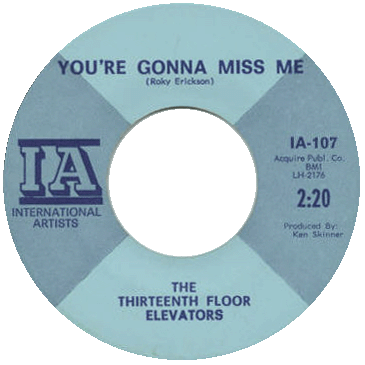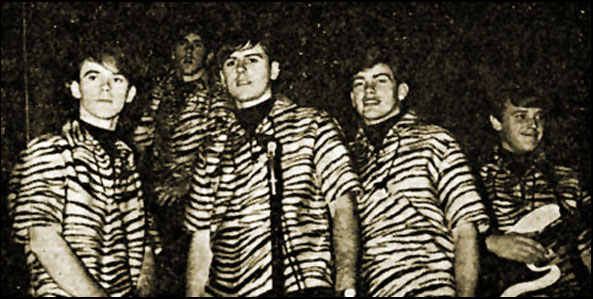

THE INTERNATIONAL ARTISTS RECORD LABEL by Patrick Lundborg |

|
see
also: International Artists Discography |
INTERNATIONAL ARTISTS from Houston, Texas is probably the most famous regional record label of the 1960s. Among record collectors and fans of the esoteric, I A has been on the map for many decades, and the legend shows no signs of fading. From the initial burst of cult excitement in the mid-1970s, interest has persisted and expanded, so that the spotlight now falls on a wider circle than the two pyramids of weirdness that first drew people to I A; Red Krayola and the 13th Floor Elevators. Today one may hear once obscure I A bands like the Golden Dawn and Thursday's Children being spoken of in an equally reverential manner as the Elevators and the Krayola. There is something enigmatic in I A that keeps attracting new generations of admirers.  The Coastliners But let's begin at the beginning. International Artists started out most humbly in 1965, founded in Houston by a young music entrepreneur named Fred Carroll. The first release was the Coastliners "Alright", which appeared in October 1965. Although something of a garage classic today, the single didn't make much impact. It seems Carroll lost interest in his newly started label, and sold it to Bill Dillard, a local lawyer who wanted to get in on the local music scene. For the princely sum of $35 Dillard and his associates aquired International Artists, which at the time consisted essentially of a printing die with the familiar I A logo. An I A corporation was formed, the owners being Dillard, his law firm partner Noble Ginther, a former recording studio owner named Lester Martin, and one Ken Skinner, who would play a vital part in the early days of the label. Skinner was mainly interested in making money fast from the pop music business, and had already formed the Tapier Music Corporation, a name recognizable to any 13th Floor Elevators fan. Ginther and Martin remained in the background, while Bill Dillard and Ken Skinner got involved with the hands-on business of the I A label. During the first months of 1966 a series of unsuccessful 45 releases in various (usually un-hip) styles followed.  Early 13th Floor Elevators on stage Then a series of events followed that would change I A forever. Skinner & Dillard got wind of a local 45 from an Austin band, released on an independent Houston label called Contact. The 45 was a big hit in both Austin and Houston, and was making waves in other parts of Texas. The band name was a little weird, the 13th Floor Elevators, but a lot of kids seemed to love them. After some complex machinations, Contact and its owner Gordon Bynum were muscled out, and International Artists signed the Elevators around May 1966. The "You're Gonna Miss Me" 45 was repressed with an I A label, and Ken Skinner celebrated this event by crediting himself as "producer" on early runs (shown above -- Bynum was the actual producer). From June and onwards the song began its second hit run, this time breaking in several cities across the US, and peaking in the Fall with a #55 position on Billboard and two Dick Clark appearances. The Elevators and "Miss Me" saga could fill a book on its own, and apart from generating a lot of cash for the label, it brought another important change - Lelan Rogers. The Houston-based I A owners realized they were out of their depth with this potential hit single, and thus Lelan Rogers was recruited from Los Angeles to handle promotion and production. Lelan Rogers is probably the most mis-represented character in the I A saga. Thanks mainly to his efforts the Elevators broke nationwide, and he was instrumental in several other now legendary acts getting signed.
The label poured a lot of money into the Elevators, who were their
flagship act. The band was kept on a weekly salary (later deducted from
sales) and substantial investments in equipment and studio time were
made for the band's second LP, "Easter Everywhere". Although
hailed as a masterpiece today, the lack of hit 45 and a delayed release
meant that "Easter" generated only modest sales, and was never
reprinted. In 1968, as the weird mix of freak bands, blues, and pop acts
persistently failed to produce strong sales, the label began to behave
nervously. © PATRICK LUNDBORG, 2007-2008
|
||